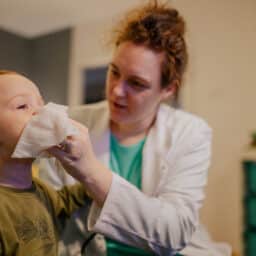Will I Ever Need to Do an Allergy Re-Test?

When you first begin seeing your allergist and talking about allergy treatments for your worst symptoms, you would have had an allergy test performed. This test, as you know, provided valuable insights into your specific allergy triggers and informed your treatment plan. Now you may be wondering: do I need to take an allergy re-test…
How To Track Your Progress After Starting Allergy Immunotherapy

The goal of immunotherapy is to retrain your immune system to react less to the allergens that trigger symptoms like congestion, itchy eyes and sneezing. Whether you’ve started allergy shots or sublingual drops, one of the most important parts of your treatment journey is monitoring your progress. How Immunotherapy Works Immunotherapy consists of two phases:…
Your Year-One Allergy Treatment Roadmap

Congratulations on starting your allergy treatment journey! Immunotherapy is a rewarding treatment that helps you get back to doing the things you love without sneezing or other annoying allergy symptoms. Your first year with immunotherapy will involve a build-up phase and a maintenance phase, and at the end of twelve months, you should already notice…
How to Choose a Clinic for Allergy Testing in the Willamette Valley

Allergy treatment is essential if you or your child is suffering from allergies and they’re impacting daily life. Treatment begins with an allergy test. If you are interested in starting allergy management treatment for yourself or for your child, you may be wondering where to begin and where to have the allergy test performed. Ask…
Pediatric Allergy Testing: A Guide for Parents

Seeing your little one with itchy eyes and a skin rash is hard, and it’s even harder when you don’t know what’s causing it. That’s where allergy testing comes in. When To Schedule an Allergy Test Schedule an allergy test if your child starts exhibiting one or more of the following symptoms: What Does an…
Comparing Allergy Shots and Allergy Drops

Immunotherapy, an allergy treatment that introduces sensitive allergens to your body in small doses to build tolerance, is an effective way to manage allergy symptoms, especially here in the grass seed capital of the world. Immunotherapy can be administered in two forms: orally as drops or as a shot. If you and your allergist are…
Staying On Track with Allergy Shots During the Winter

Winter can bring many incidents that may cause you to miss an immunotherapy appointment. Perhaps you were visiting family for the holidays or New Year’s Eve, and you were unable to make an appointment. Or maybe flu season caught up with you this year, and illness obliged you to stay at home. Staying on top…
Traveling with Allergies: What to Plan For

The holidays are a popular time to travel. Whether you’re traveling to visit loved ones for the holiday or escaping the cold weather at a tropical destination, you could be surprised by allergies. Don’t let allergy symptoms disrupt your trip. Common Allergy Hazards While Traveling Any time you change your environment, you encounter new allergens….
What You Need to Know About Christmas Trees and Mold

Whether you got your real Christmas tree from a lot or a farm, there is a real risk that it carries mold. Mold is a common cause of allergy symptoms, and it becomes an even more prominent problem in the damp winter months. Am I Allergic to My Christmas Tree? If you’ve recently brought your…
What Do My Allergy Test Results Mean?

If you or your child have recently had an allergy test, you may be wondering how to read the results. Let’s discuss potential result outputs, what they mean and what to do next. Types of Allergy Tests There are two types of allergy tests that we perform at : skin prick and blood test. A…
“Have always found the staff and doctors here to be helpful. This was my first visit with Dr. Prze after Dr. Allan retired, and he was very friendly, enthusiastic, and thorough. It was obvious he had read my chart carefully before my checkup.”